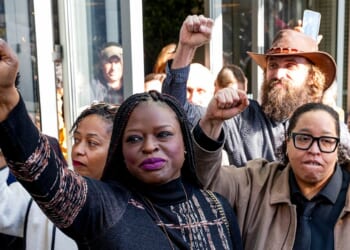
I am a Christian nationalist.
In the aftermath of Charlie Kirk’s worshipful memorial service, the political left has predictably busied itself with slander, labeling the event “Christian Nationalism’s biggest moment” or even a Nazi rally.
Neither of these heinous descriptions are accurate. The Babylon Bee satirically mocked these claims with the headline “Nazi Rally Inspires Millions to Forgive And Love Their Enemies.” Indeed, Erika Kirk’s public and emotionally charged forgiveness of her husband’s murderer was one of the most powerful redemptive moments of our time.
It’s now undeniable that the Left aims to label everyday conservative Christians who are politically active as “Christian Nationalists.” Their exaggerated smear tactics are now widely recognized, consistently branding anyone who disagrees with them as Nazi, racist, homophobic, transphobic, “far right” and other melodramatic terms.
This lengthy list of slanderous accusations has lost its ability to intimidate. It has so altered and diluted the meaning of these terms that some on the political right are now proudly adopting them. The Left intends to attach a negative connotation to Christian nationalism and use it as a cudgel to slander Christians. We should embrace the term and welcome the challenge.
But what is Christian nationalism? Why does the Evangelical community seem so divided on this issue, with some condemning Christian nationalism as heresy and others embracing it as the conduit for the coming millennial Kingdom of Jesus Christ?
The phrase has sparked lively debate within the Evangelical community as different interpretations emerge from Christian pulpits and publications across America. Since there is no widely accepted definition, many argue from an ideological standpoint that is more shaped by preexisting political views than linguistic accuracy.
The term needs a standard and reductive definition. Simply put, Christian nationalism should be defined as obedience to Jesus Christ that manifests itself in working for the good of the nation.
There are many precedents for this idea in both the Old and New Testaments. In Jeremiah 29:7, Jeremiah instructs Jewish exiles in Babylon to seek the welfare of their resident city. In 1 Peter 2:17, Peter reminds Christians to honor the emperor.
Two mistaken ideas at each end of the theological spectrum are fueling the debate about Christian Nationalism. On one side: the idea that Christians should be entirely focused on the Gospel and nothing else. This view suggests that the Great Commission calls for a singular emphasis on spreading the Gospel, and any distraction into worldly politics is a detour.
The opposing view argues that America should be restored as a Christian nation led solely by Christians and equipped with Christian institutions. They believe the government should promote Christianity as the only valid faith. While most in this group acknowledge that believers cannot be forced to have saving faith in Jesus Christ, they correctly see that the Christian worldview is true but also believe it should dominate government.
Both ideas are embraced by faithful conservative Christians who belong to Bible-believing churches committed to solid doctrine and living out their Christian faith in a hostile world. Most in both groups love America and want the best for its citizens.
But both extremes go too far. God has established three institutions to promote human flourishing: the government, the church and the family. All three divinely appointed institutions have specific roles, and when they overstep their functions, the results can be disastrous.
Attempting to spread the Gospel without addressing societal issues does not align with the biblical model. Good always opposes evil, and the Church must stand against unjust governments and harmful cultural trends. Over the past four decades, the American church has often fallen short in this mission, leaving the nation in moral and spiritual turmoil.
On the other hand, the pendulum cannot swing too far. There is no biblical mandate for Christians to establish a church-run government. The role of the government is clearly outlined in many biblical passages, especially in Romans 13:1-7. The government is to bear the sword as a servant of God and deliver justice to wrongdoers.
There is no requirement for the Church to assume this role. However, individual Christians can and should participate in all areas of government as part of this process. However, every Christian should get involved in the political process. The primary obligation is to stay informed about policies and candidates, and to vote wisely in accordance with a Christian worldview.
Some Christians will be called to serve more actively, including speaking out politically or culturally, especially in resisting evil or misguided ideologies. Charlie Kirk dedicated his life to this mission and paid the ultimate price. The political left could not counter his arguments with logic, so an assassin inspired by their ideas ended his life with violence. His influence only grew stronger; the truth will always prevail.
The Left responded to Charlie’s memorial by derogatorily labeling those who gathered to honor Charlie Kirk as Christian nationalists. Therefore, let us become so — for the glory of God, the furtherance of the Gospel and the good of America.
Dr. David Murphy is a Faculty Fellow at the Centennial Institute and the Dean of Behavioral and Social Sciences, College of Adult and Graduate Studies at Colorado Christian University. He served 25 years as an Air Force fighter pilot and Group Commander before retiring in 2014. He writes extensively on national security and domestic policy. The views expressed by the author are his own and do not represent the views of Centennial Institute or Colorado Christian University.

















